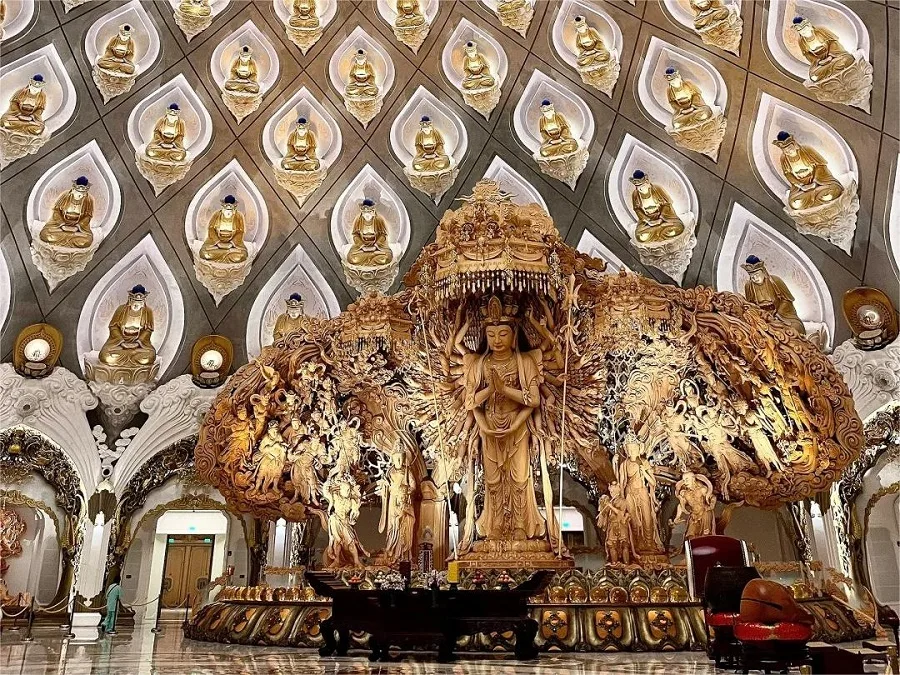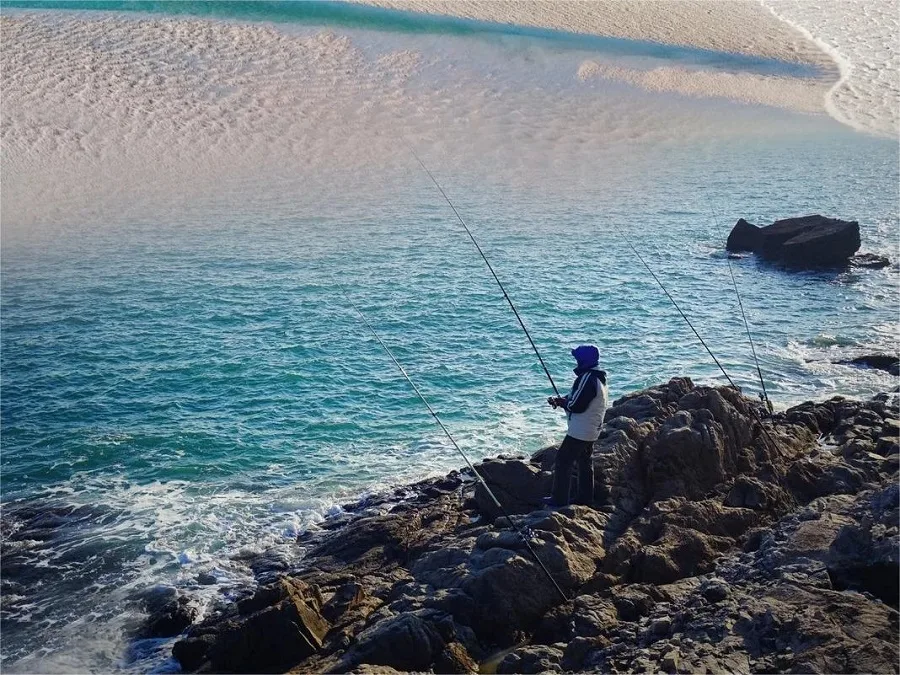Zhujiajian Island (朱家尖岛), the fifth largest island in the Zhoushan Archipelago, spans an area of 72 square kilometers. The island features the impressive Jiuren Chain Beach, a 6,300-meter-long stretch of golden sand resembling a necklace set between verdant hills and the azure sea. Each September, the Zhoushan International Sand Sculpture Festival is held here, drawing numerous visitors with its grand sand sculptures. The sand quality on Zhujiajian’s beaches is recognized by international sand sculpture organizations as one of the best, surpassing even the famed Hawaiian Islands.
The island also offers a variety of water sports and activities. On clear days, visitors can take boat trips to explore the surrounding waters. The coastline is adorned with striking black pebbles, adding to its unique charm.
Zhujiajian has developed several key attractions, including the International Sand Sculpture Art Square (Nansha Scenic Area), the Black Pebble Beach (Wushitang Scenic Area), the Guanyin Culture Garden (Baishan Scenic Area), the Dongsha Beach, the Daqingshan National Park, and the Guanyin Dharma Realm. These sites are well-equipped with tourism and vacation facilities, ensuring a comfortable and enjoyable experience for visitors.
Table of Contents
- Basic Information
- Location and Transportation
- Highlights of Zhujiajian Island
- Attractions near Zhujiajian Island
Basic Information
| Estimated Length of Tour | 1 day |
| Ticket Price | The Island: Free Daqingshan Island Ecological Park: 100 RMB Sand Sculpture Art Square: 70 RMB Wushi Gravel Beach: 40 RMB Impression of Putuo: 288 RMB Baisha Island: 35 RMB |
| Opening Hours | 7.30 – 20.00 |
Location and Transportation
Zhujiajian is situated in the southeastern part of the Zhoushan Archipelago in Zhejiang Province, China. It lies between approximately 29°50′ to 29°57′ north latitude and 122°50′ to 122°56′ east longitude. As a crucial component of the core tourism area known as the “Putuo Golden Triangle” within the Zhoushan Archipelago, Zhujiajian offers easy access to visitors.
From Mount Putuo, a renowned Buddhist site, visitors can reach Zhujiajian in just 5 minutes by taking a speedboat. Additionally, Zhujiajian is only 1 kilometer away from Shenjiamen Fishing Port, one of the world’s four major fishing ports. A sea-crossing bridge connects Zhujiajian with Shenjiamen (and the entire Zhoushan Main Island), providing convenient access for travelers arriving by road from cities such as Hangzhou, Shanghai, and Ningbo.
Highlights of Zhujiajian Island
Daqingshan Island Ecological Park

Daqingshan Island Ecological Park, located on the southern end of Zhujiajian Island, covers an area of 2.97 square kilometers. This park is dominated by the island’s highest peak, Daqingshan, which reaches an elevation of 378.6 meters. The terrain here is dramatic and rugged, featuring steep cliffs, deep ravines, and a coastline that stretches over 30 kilometers. The park is renowned for its diverse coastal formations, including sea cliffs, marine terraces, sea-eroded ravines, and headlands. One of the most striking features is the Cliff Park, centered around Lizhunu Sea Gorge, which is celebrated as a “gathering place of sea cliffs and rocks.” A highlight of this park is the approximately 100-meter-long suspension bridge that spans the sea gorge, offering visitors a thrilling experience and a chance to marvel at the breathtaking natural landscape.
Additionally, Daqingshan is home to the “Chinese Shaojibu Bay Fishing Village,” the most well-preserved traditional fishing village in the coastal region of eastern Zhejiang. This village offers a glimpse into the historical and cultural heritage of the local fishing communities.
Sand Sculpture Art Square

The Sand Sculpture Art Square in Nansha Scenic Area is another must-see attraction on Zhujiajian Island. Located along the southeastern coast, this area features five interconnected beaches: Dongsha, Nansha, Qiansha, Lisha, and Qingsha, collectively known as the “Ten Li of Golden Sands.” These beaches stretch nearly 5 kilometers and are framed by green hills and clear blue waters, creating a picturesque setting. Each beach is flanked by headlands that form natural coves, with lush forests embracing the sandy shores. The beaches are known for their fine, pure sand, which is rare along China’s coastline.
The Sand Sculpture Art Square gained international fame in 1999 when it hosted the inaugural China Zhoushan International Sand Sculpture Festival. Since then, every September to October, sand sculptors from around the world gather here to showcase their skills and create intricate and large-scale sand sculptures. This annual festival has become a major event, attracting tourists and artists alike, and contributing to Zhujiajian’s reputation as a hub for sand sculpture art.
Wushi Gravel Beach

Wushi Gravel Beach is located on the western coast of Zhangzhou Bay. This 500-meter-long, 100-meter-wide, and 5-meter-high beach is covered with smooth, shiny black pebbles, a natural marvel formed over millions of years. These pebbles originated from the Yanshan Movement, around 100 million years ago, when the mountains on both sides of the bay broke apart and tumbled into the sea. The relentless waves and tides of the East China Sea gradually eroded the sharp edges of the rocks, creating the smooth, round pebbles we see today. The pebbles, polished by the ceaseless motion of the sea, were eventually washed ashore, forming the impressive Wushi Gravel Beach. On moonlit nights, the sound of the waves interacting with the pebbles creates a unique auditory experience known as “Wushi Listening to the Tides,” adding to the beach’s charm and allure.
Guanyin Cultural Garden

Located on the northern cliffs of Zhujiajian Island, the Guanyin Cultural Garden offers breathtaking views and profound spiritual experiences. One of the garden’s most striking features is a colossal 69-meter-high mural of the Compassionate Guanyin, painted on the cliff and covering an area of 2,000 square meters. This magnificent artwork has earned the garden the nickname “The Mogao Caves of the Sea.”
At the heart of the Guanyin Cultural Garden is the Guanyin Altar, a central and iconic structure of the Guanyin Cultural Realm. The altar combines religious, artistic, educational, and tourist elements, serving as a place for pilgrimage, art appreciation, learning, and sightseeing. The altar has a diameter of 150 meters, and the surrounding plaza spans 219 meters, accommodating up to 50,000 people. This is also where the the “Impression of Putuo” live performance take splace. This Show blends Guanyin culture with the Buddhist traditions and marine customs of Putuo, offering an immersive and interactive experience for the audience. The show not only showcases the rich cultural heritage of the region but also engages visitors with its stunning visuals and storytelling.
Baisha Island

Baishan Island lies to the west of Zhujiajian, just a 20-minute boat ride away. To the northeast, it faces the famous Mount Putuo, one of China’s four major Buddhist mountains. The island is rich in local customs, with friendly and hospitable fishermen. Visitors can enjoy stunning landscapes featuring crystal-clear waters, green islets, pebble beaches, and striking rock formations under clear blue skies.
Baisha island is part of the Yang’an Fishing Grounds, known for its abundant fish species such as bream and bass, making it an ideal spot for sea fishing. In fact, Baisha Island is recognized as China’s first themed fishing island, offering both professional fishing areas and leisure fishing spots for tourists. Visitors can engage in traditional fishing activities, such as netting and catching fish from an ancient-style fishing boat, providing a unique and immersive “fisherman’s delight” experience.





